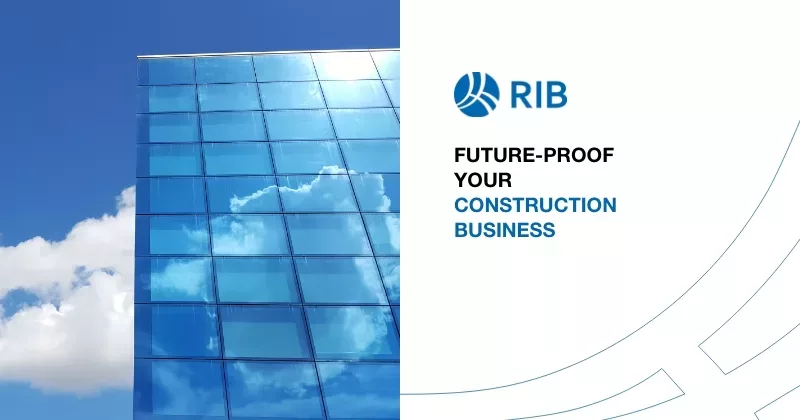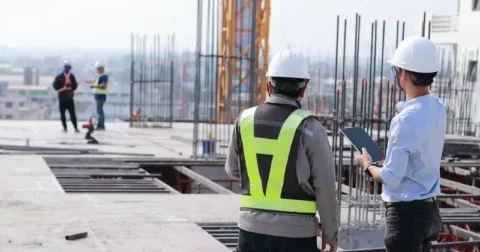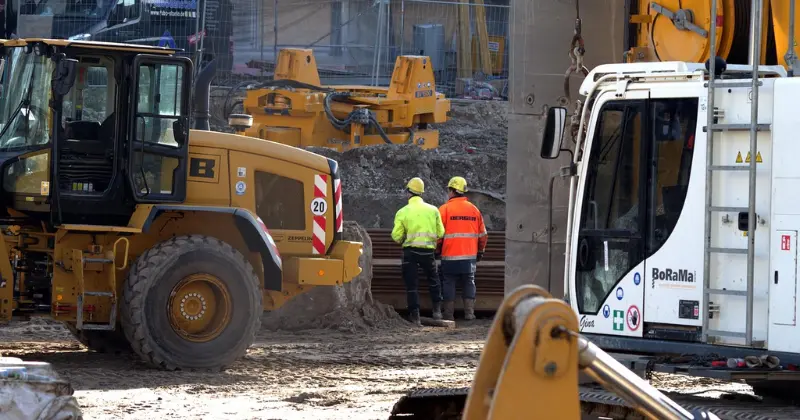24 mins read
Exploring the Critical Role of a Construction Executive

- What is a Construction Executive?
- What Does a Construction Project Executive Do?
- Key Construction Executive Skills
- How Much Can You Earn in Construction Executive Jobs?
- How To Become a Construction Project Executive
- What Common Challenges Do Construction Executives Face?
- What Kind of Software Do Construction Executives Use?
- Final Thoughts
A construction executive is more than simply a manager; they are a visionary leader tasked with steering ventures to success while negotiating complicated challenges. They balance strategic decision-making, financial control, and risk management to ensure that construction projects are in line with the company’s goals. Construction executives promote innovation via practices such as embracing sustainability and cultivating critical stakeholder partnerships.
In this blog, we dive into the scope of their responsibilities, skills, and the importance of strong leadership in the demanding construction sector.
What is a Construction Executive?
A construction executive is a senior executive who manages projects in accordance with the company’s long-term strategy and goals. They play an important role in budgeting, risk management, and project selection, as well as developing vital stakeholder connections.
In addition to financial and operational control, construction executives drive innovation by promoting the use of new technology and sustainable building methods. They must also deal with market swings, labor shortages, and changing regulatory requirements, making their job both difficult and vital to a construction company’s performance. Strong leadership, a good understanding of the industry, and business acumen are required for success in this role.
Construction Executive vs Construction Project Manager
While both construction executives and construction project managers are critical to a construction venture’s success, their roles vary greatly.
A construction project manager oversees the execution of certain ventures, ensuring that activities are performed on schedule, within budget, and to quality standards. They manage schedules, negotiate with subcontractors, and resolve on-site issues. Their function is more tactical, emphasizing the day-to-day issues of building.
A construction executive, on the other hand, takes a more comprehensive, strategic approach. They manage several initiatives or whole portfolios, ensuring that operations are consistent with company goals. Rather than overseeing a single site, they are responsible for company-wide decisions, long-term financial planning, and growth.
Project managers can advance to positions such as project directors or senior construction managers before transitioning to executive leadership. Meanwhile, construction executives often move to vice president or Chief Construction Officer (CCO) roles, where they direct the company’s entire strategy and long-term performance.
What Does a Construction Project Executive Do?

As already mentioned, the construction executive job description is to oversee the whole lifecycle of large-scale construction initiatives. In addition to managing day-to-day operations, their duties also include growing the organization, engaging with stakeholders, financial stewardship, risk management, and strategic oversight. Here’s a more detailed look at what each of their primary roles includes.
1. Oversees Decision-Making
- Strategic leadership. The construction executive is the ultimate decision-maker on significant projects, including its overall direction and priorities. They make sure that the company’s long-term goals are considered in all decisions.
- Resource allocation. Construction executives strike a balance between opposing needs to optimize efficiency by determining how resources – whether financial, human, or material – are divided among different components.
- Putting policies into action. To provide a compliant and ethical work environment, the construction executive makes sure that decision-making takes into account existing rules, industry standards, and best practices.
2. Aligns Project Outcomes with Organizational Goals
- Vision integration. The construction project executive ensures that the project’s goals are based on the organization’s long-term vision and purpose and that each step of it contributes to these overarching objectives. This ensures that its outcomes are in line with the organization’s goals.
- Performance metrics. To make it simpler to track the success or failure of a project, construction KPIs are put into place to connect its results to the organization’s long-term objectives.
- Continuous alignment. The construction project executive monitors the project’s progress against organizational expectations and makes course corrections as needed throughout its lifecycle.
3. Assesses and Manages Risks
- Risk identification. An important aspect of the function is to anticipate and identify any risks, such as changes in regulations, changes in the market, interruptions in the supply chain, or safety risks.
- Mitigation strategies. They also create and execute detailed plans for construction risk management, such as those for responding to crises and contingencies.
- Monitoring and reporting. To keep mitigation strategies up-to-date and successful, ongoing risk assessment necessitates frequent monitoring through a robust construction reporting system. This includes analyzing risk factors and providing stakeholders with updates on the risk status.
4. Oversees Financial Management
- Budget development. The executive must perform appropriate construction budget management, making sure that funds are distributed effectively and efficiently.
- Cost control. They make sure that spending doesn’t go over budget and take steps to keep expenses down without compromising on safety or quality.
- Financial forecasting. The executive can predict future costs and revenues by examining financial data, which allows for timely changes to prevent budget overruns.
- Investment evaluation. They make sure that investments are in line with the company’s strategic financial objectives by evaluating the financial feasibility of new projects or stages of existing ones.
5. Ensure Stakeholder Collaboration
- Communication. The executive liaises with various construction roles, including internal teams, regulatory agencies, clients, contractors, engineers, and architects, to ensure that all parties involved have open and effective lines of communication.
- Conflict resolution. They make sure the project stays on track even when stakeholders have different interests or viewpoints by addressing and resolving disagreements or misunderstandings.
- Developing connections. For a venture to be a success, the executive must make sure that everyone involved is on the same page and can work together effectively.
6. Communicates and Reports on Performance
- Progress updates. The executive regularly provides comprehensive status updates to senior management, board members, and external stakeholders, emphasizing milestones, successes, and opportunities for improvement.
- Data-driven insights. By analyzing metrics and performance, they provide decision-makers with clear and actionable insights that help them tweak their strategies.
- Transparency. Encouraging open communication and honest reporting fosters confidence among stakeholders and guarantees responsibility at all stages.
7. Constantly Looking for Clients or Business Opportunities
- Business development. In order to secure future contracts and promote corporate development, the executive aggressively seeks out opportunities for new opportunities. This may be done via networking, events, or strategic collaborations.
- Market analysis. To find opportunities that fit the company’s strengths and meet market demand, they stay up to date on construction industry trends, new technology, and competitive dynamics.
- Client engagement. Consistent project funding is essential to an organization’s long-term viability, so they keep in touch with existing clients and cultivate ties with prospective new ones.
Key Construction Executive Skills

- Time Management: Executives in the construction sector successfully manage several projects, teams, and deadlines by setting priorities, allocating resources, and keeping schedules on track. To maximize output, it is essential to use methods of project management and delegation.
- Leadership: When managing teams that vary in terms of engineering, contractors, and stakeholders, strong leadership is vital. Inspiring trust, encouraging teamwork, and making quick decisions are all essential skills for this role.
- Problem-Solving: Unforeseen problems like delays, budget overruns, or regulatory complications are common during construction jobs. A construction project executive must be quick-thinking, have great problem-solving skills, and have the ability to think on their feet.
- Financial Proficiency: A construction executive should be able to create and stick to budgets, keep costs in check, and make accurate financial predictions. Maintaining a healthy profit margin while keeping costs in check is also part of their responsibility.
- Industry Knowledge: A construction executive must be well-versed in the construction sector by keeping up to date on all the latest techniques, materials, safety laws, and advances in technology. Strategic decisions are affected by sustainable construction practices, challenges within the supply chain, and market trends. He/she must also have a deep understanding of local international building laws to ensure compliance.
- Analytical Thinking: To maximize the success of projects, an executive needs to be able to make data-driven decisions. Risk assessments, interpreting reports, and performing analyses are all responsibilities of executives. For better results, they should use tools like BIM takeoff software, digital twins, and artificial intelligence (AI) powered forecasting.
- Communication & Networking: When interacting with customers, investors, government authorities, and internal teams, it is crucial to possess strong communication skills. The best way to meet influential people in your field is to take advantage of networking opportunities, conferences, and other events. If you want to close agreements or propose ideas effectively, you need strong presenting and negotiating abilities.
- Business Mindset: Leaders in the building industry should not be fixated on short-term gains but should instead focus on long-term growth. The most important thing is to find new ways to make money, form partnerships, and expand into new markets.
How Much Can You Earn in Construction Executive Jobs?
When it comes to construction executive jobs, salaries may range from very low to very high depending on criteria, including years of experience, geographic region, company size, and job function. Executives in the construction industry can earn six-figure salaries plus stock options, performance bonuses, and other perks.
According to the Robert Half 2025 Salary Guide, the average salary for a construction executive in the US is between $95,000 and $160,000 a year, with the exact figure dependent on the manager’s level of expertise and the scope of the projects they manage. The same guide indicates that directors of operations and vice presidents of construction, among others, can earn salaries of $150,000 to $250,000 or even more, particularly in highly competitive metropolitan areas. The base salary of a Chief Operating Officer (COO) or Chief Construction Officer (CCO) of a large company could easily exceed $300,000, without including bonuses, profit sharing, and other executive benefits.
Data from Totaljobs indicates that construction executives in London, one of the most active construction markets in Europe, earn some of the highest incomes on the continent. Depending on experience and qualifications, construction managers can expect to earn an annual salary ranging from £60,000 to £100,000, while project directors and operations directors can expect salaries between £90,000 and £150,000. Top-tier executives, such as COOs and CCOs, frequently earn upwards of £150,000 to £300,000, with significant bonuses and long-term incentives adding total compensation.
The pay for executives is also very competitive in Europe, a continent that is a major player in building and infrastructure projects. In Germany, for example, directors of construction or operations managers could expect to make €120,000 to €180,000 annually, while construction managers can earn between €70,000 and €120,000 (Payscale). Salary.com reports that the average salary for a Chief Executive Officer (CEO) in Germany is €354,175 per year, with a typical range between €174,679 and €575,074.
Earnings also vary by sector. Construction workers in the residential sector often receive lower wages than those in the commercial and infrastructure sectors. Due to the technical skill and leadership necessary for specialized sectors such as renewable energy infrastructure and industrial building, executives in these fields often earn premium compensation.
Expense accounts, corporate cars, stock options, performance incentives, profit sharing, and expense accounts are some of the perks that construction executives often enjoy. Some may also receive relocation packages for international assignments or leadership roles in expanding markets.
Earning potential grows with experience, leadership roles, and project complexity, making it an attractive career choice for those seeking substantial financial benefits.
How To Become a Construction Project Executive
Becoming a construction project executive involves a blend of formal education, extensive industry experience, and the development of key leadership skills. Typically, people start by getting a bachelor’s degree in fields like construction management, civil engineering, or company administration. In the US, for example, most managers have a bachelor’s degree in construction management or a related field, and some go on to get master’s degrees to round out their education.
In addition to a formal degree, you must have extensive work experience in the construction business. You can gain valuable experience in project management and execution by beginning your career in a position such as a site supervisor or project manager. Over time, advancing to senior management positions provides the strategic perspective necessary for a construction project executive role.
Additionally, obtaining professional certifications can bolster your credentials. Globally recognized accreditations like the Project Management Professional (PMP) certification are well-respected and can demonstrate your commitment to the profession.
Keep in mind that educational and certification standards could differ from one country to another. So, it’s up to you to find out what credentials are accepted in your preferred area of practice.
What Common Challenges Do Construction Executives Face?

An executive in the construction market must be able to juggle the competing demands of strategic leadership, financial supervision, and operational efficiency. Construction executives often confront a multitude of problems that put their flexibility, decision-making, and capacity to deliver long-term success to the test.
- Making Strategic Decisions in a Changing Landscape
Market demand, technical developments, and economic cycles all have significant impacts on the construction industry. Executives need to make smart choices that set their company up for long-term success, while also anticipating trends in the market like labor shortages, interruptions in the supply chain, and changes in real estate development. Also, they need to be nimble and proactive, since factors like inflation, increasing material prices, and geopolitical events may affect the feasibility of construction initiatives.
- Balancing Financial Goals with Sustainability Goals
Sustainability is becoming an essential need in many sectors, rather than only a corporate buzzword. Construction executives must combine sustainable construction methods while maintaining profitability. Managing tight budgets while guaranteeing financial returns is essential, as is investing in energy-efficient technology, procuring environmentally friendly materials, and complying with green construction standards. Finding the right balance between being cost-effective and environmentally responsible is never easy. It becomes much more difficult when customers or investors put short-term savings ahead of long-term sustainability.
- Keeping Up with Regulatory Requirements
The construction market is one of the most heavily regulated sectors, with stringent safety, labor, and environmental laws that vary by region. To avoid fines and remain compliant, executives should monitor changes to rules including OSHA standards, construction codes, and worker safety legislation. Multinational construction enterprises have an additional challenge in today’s globally integrated market: complying with different sets of regulations in each country in which they operate.
- Aligning Diverse Teams with a Common Strategic Vision
Every member of a construction executive’s teams – from project managers and engineers to architects and subcontractors – has their own unique set of responsibilities and points of view. Strong leadership, effective communication, and the capacity to encourage cooperation are necessary to ensure that all parties involved are in sync with the overarching objectives of the organization. Managing a diverse staff, especially one that is geographically dispersed, calls for the ability to communicate expectations clearly, keep morale high, and resolve disagreements amicably.
- Finding Time for Personal Interests and Health Amidst a Demanding Work Environment
Maintaining a good work-life balance is typically a challenge for construction executives due to the long hours, high-stakes decision-making, and continual pressure to fulfil deadlines. The stress of managing multimillion-dollar projects, negotiating contracts, and monitoring financial success undoubtedly takes a toll on their physical and mental well-being. Executives must learn to effectively manage their time and reduce stress in order to find time for personal hobbies, family, and self-care.
- Driving Innovation While Managing Risk
Modular building, digital twin technology, and AI-driven project management are transforming the construction sector. Executives must manage the risks connected with adopting new technology, even while innovation is critical to being competitive. It’s critical for executives to find a middle ground between being innovative and minimizing risk, since investing in ideas that haven’t been proved might result in financial losses or inefficiencies in the construction job.
What Kind of Software Do Construction Executives Use?
Construction executives handle complicated projects that require them to manage different teams, finances, and regulations while maintaining efficiency and profitability. To properly manage these responsibilities, they use a variety of specialized software solutions that streamline operations, improve communication, and give essential insights.
- Construction Planning Software
Construction executives want strong planning tools to keep projects on track and under budget. Construction planning software facilitates scheduling, resource allocation, and risk forecasting, enabling executives to make educated choices and avoid expensive delays.
RIB Candy improves construction planning by providing sophisticated scheduling, cost estimating, and resource management tools, allowing executives to maximize productivity and avoid budget overruns.
With its real-time monitoring capabilities, construction executives can spot possible bottlenecks early on and adapt deadlines appropriately. By incorporating cost control and forecasting tools, it guarantees that projects are financially viable while maintaining high operational efficiency.
- Document Management Software
With so much paperwork involved in construction – contracts, permits, designs, compliance reports, and so on – document management software is critical. These systems offer seamless communication across stakeholders, allowing teams to view and change files in real time.
RIB CX streamlines document management by offering a single platform for easy collaboration and real-time modifications.
With its cloud-based solution, teams can securely view, modify, and share vital documents from any location, decreasing the possibility of errors and misunderstandings. Automated version control and compliance monitoring guarantee that executives have complete insight into documents, which improves productivity and regulatory compliance.
- Reporting and Analytics Software
Data-driven decision-making is critical for construction executives, since it helps them to monitor financial performance, status, and operational efficiency. Reporting and analytics software collects data from many sources and presents executives with dashboards and reports that provide a clear picture of KPIs. These insights assist them in identifying trends, mitigating risks, and optimizing resource allocation, eventually leading to better-informed strategic choices.
RIB BI+ provides construction executives with real-time data analytics that convert complicated project data into practical insights.
The software’s easy dashboards combine financial, operational, and project performance information, providing management with a quick overview of KPIs. With predictive analytics and customizable reporting, executives can proactively identify risks, optimize resource allocation, and drive smarter strategic decisions.
- Contract Management Software
Managing contracts across various projects and stakeholders may be challenging. Contract management software automates document preparation, tracks contract lifecycles, and ensures legal and financial compliance. These technologies assist executives to manage commitments, decrease the risk of contract disputes, and get improved insight into contract performance, enabling them to negotiate better terms and avoid any legal issues.
Final Thoughts
Construction executives play a vital role in driving the success of construction jobs, managing risk, and ensuring long-term growth. Their ability to balance strategic decision-making, financial oversight, and stakeholder collaboration makes them indispensable to the industry. With increasing challenges like evolving regulations, sustainability demands, and technological advancements, construction executives must leverage the right tools to stay ahead.
Take the Next Step!
At RIB Software, we empower construction executives with industry-leading solutions. Our software enhances project efficiency, optimizes financial management, and provides real-time data insights – all crucial for making informed executive decisions.
See how our solutions can streamline your projects and drive profitability. Get your free demo for RIB’s toolkit today!
Most Recent
24 mins read
11 mins read
11 mins read
4 mins read
Blog Categories

Ebook











